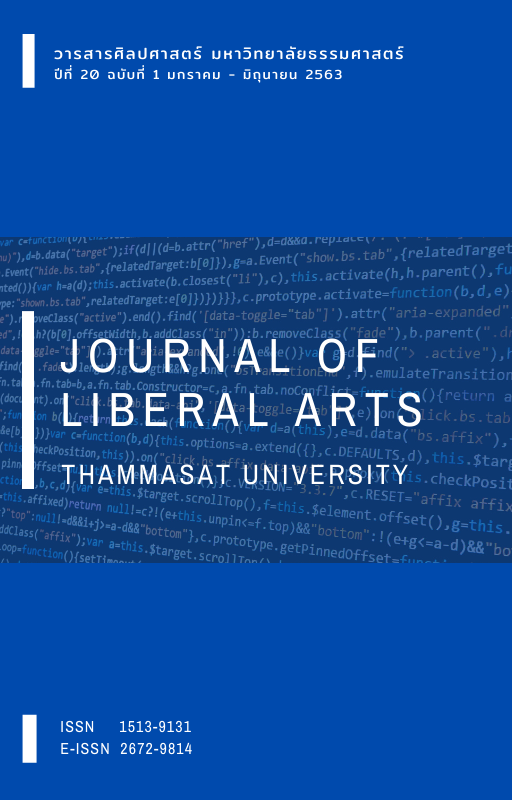Material Turn ในสาขาประวัติศาสตร์ ทฤษฎี Actor-Network กับแนวคิดวัตถุในฐานะผู้กระทำการทางประวัติศาสตร์
Main Article Content
บทคัดย่อ
กระแสในการศึกษาสังคมศาสตร์และมนุษยศาสตร์ในโลกปัจจุบันที่มีความเจริญก้าวหน้าทางวัตถุอย่างมาก จนไม่อาจปฏิเสธความสำคัญและอิทธิพลของวัตถุที่มีต่อมนุษย์ ทำให้มีการหันมาทบทวนภววิทยาของวัตถุกันใหม่ หนึ่งในแนวทางการศึกษาที่ให้ความสำคัญกับวัตถุ และเป็นที่ถกเถียงกันมาก คือ ทฤษฎี actor-network ที่มีข้อเสนอหลักว่าลักษณะของความเป็นผู้กระทำการนั้น กระจายตัวอยู่ทั้งในผู้แสดงที่เป็นมนุษย์และไม่ใช่มนุษย์ ตลอดจนเสนอการก้าวข้ามคู่ตรงข้ามที่หลากหลาย ระหว่างสังคมกับธรรมชาติ เทคโนโลยีกับสังคม และระหว่างมนุษย์กับสิ่งที่ไม่ใช่มนุษย์ บทความนี้ทบทวนแนวคิดเรื่อง Material Turn และการแพร่ขยายของ Material Turn เข้าสู่พื้นที่ของงานศึกษาด้านประวัติศาสตร์ ตลอดจนทบทวนแนวคิดทฤษฎี actor-network โดยเฉพาะอย่างยิ่งในประเด็นเรื่อง “ผู้กระทำการ” ว่าเมื่อทฤษฎี actor-network ได้แพร่เข้าสู่งานศึกษาด้านประวัติศาสตร์ เราจะสามารถมองวัตถุในฐานะผู้กระทำการทางประวัติศาสตร์ได้อย่างไรในแง่กรอบการวิเคราะห์ และประวัติศาสตร์นิพนธ์ โดยบทความนี้เสนอว่าการประยุกต์ใช้กรอบการมองแบบทฤษฎี actor-network จะช่วยให้งานศึกษาประวัติศาสตร์มีเลนส์ในการวิเคราะห์ใหม่ ที่ทำให้พิจารณาเหตุการณ์ทางประวัติศาสตร์ได้รอบด้านขึ้น และยังทำให้ประวัติศาสตร์สามารถสนทนากับศาสตร์อื่น ๆ ในกระแสการศึกษาที่กำลังเปลี่ยนแปลงไปอย่างรวดเร็ว
Downloads
Article Details
เอกสารอ้างอิง
จักรกริช สังขมณี. (2559). ความไม่(เคย)เป็นสมัยใหม่ของศาสตร์-อศาสตร์: อวัตถุวิสัยอมนุษยนิยม และเครือข่าย-ผู้กระทำของบรูโน ลาตูร์. ใน จันทนี เจริญศรี (บรรณาธิการ). ศาสตร์ อศาสตร์: เข้ามา ข้างนอกออกไปข้างใน (น. 142-171). นนทบุรี: พารา กราฟ.
จันทนี เจริญศรี. (2559). ศาสตร์ อศาสตร์: เข้ามาข้างนอก ออกไปข้างใน. ใน จันทนี เจริญศรี (บรรณาธิการ). ศาสตร์ อศาสตร์: เข้ามา ข้างนอกออกไปข้างใน (น. 18-41). นนทบุรี: พารา กราฟ.
เชษฐา พวงหัตถ์. (2549). วิวาทะ Structure - Agency และการหาทางออกให้กับปัญหาทวิลักษณ์นิยม: Marxism versus Foucault. วารสารสังคมศาสตร์, 37(1-2), 128-187.
ชญาน์ทัต ศุภชลาศัย. (2560). สลาวอย ชิเชค VS เกรแฮม ฮาแมน: วิวาทะปรัชญาร่วมสมัย. วารสารสังคมศาสตร์, 47(2), 149-176.
โสรัจจ์ หงศ์ลดารมภ์. (2560). ก็องแต็งเมยาซูกับปัญหาเรื่องความชั่วร้าย. Retrieved July 27 2019, from https://philoflanguage.wordpress.com/tag/สัจนิยม/
Bennette, J. (2015). Systems and Things: On Vital Materialism and Object-Oriented Philosophy. In G. Richard (Ed.). The Nonhuman Turn (pp. 223-240). Minnesota: University of Minnesota Press.
Blackburn, S. (2005). The Oxford dictionary of philosophy. Oxford New York: Oxford University Press.
Bowker, G. (2007). Actor-Network Theory. In G. Ritzer (Ed.), The Blackwell Encyclopedia of Sociology. doi:10.1002/9781405165518.wbeosa009
Colley, L. M. (2015). Taking the stairs” to break the ceiling: understanding students’ conceptions of the intersections of historical agency, gender equity, and action (Doctoral Dissertation). University of Kentucky, Kentucky.
Crawford, C. S. (2005). Actor network theory. In G. Ritzer (Ed.), Encyclopedia of social theory (Vol. 1, pp. 1-3). Thousand Oaks, CA: SAGE Publications.
Duncan, S. (2019). Thomas Hobbes. In E. N. Zalta (Ed.), The Stanford Encyclopedia of Philosophy (Spring 2019 ed.). Retrieved from https://plato.stanford.edu/archives/spr2019/entries/hobbes
Elder-Vass, D. (2008). Searching for realism, structure and agency in Actor Network Theory. British Journal of Sociology, 59(3), 455-473.
Ewing, A. (1984). “The Indian Civil Service 1919-1924: Service Discontent and the Response in London and in Delhi”. Modern Asian Studies, 18(1), 33-53.
Fisher, S. (2014). Pierre Gassendi. In E. N. Zalta (Ed.), The Stanford Encyclopedia of Philosophy (Spring 2014 ed.). Retrieved from https://plato.stanford.edu/archives/spr2014/entries/gassendi/
Fulbrook, M. (2002). Historical theory. London, New York: Routledge.
Fuller, S. (2007). Actor-Network Theory, Actants. In G. Ritzer (Ed.), The Blackwell Encyclopedia of Sociology. doi:10.1002/9781405165518.wbeosa009
Frow, J. (2010). Matter and materialism: A brief pre-history of the present. In T. Bennett & P. Joyce (Eds.). Material Powers: Cultural studies, history and the material turn (pp. 25-37). London, New York: Routledge.
Joyce, P., & Bennett, T. (2010). Material powers: introduction. In T. Bennett & P. Joyce (Eds.). Material Powers: Cultural studies, history and the material turn (pp. 1-21). London, New York: Routledge.
Joyce, P. (2010). Filing the Raj: Political technologies of the Imperial British state. In T. Bennett & P. Joyce (Eds.). Material Powers: Cultural studies, history and the material turn (pp. 102-123). London, New York: Routledge.
Latour, B. (2002). Gabriel Tarde and the end of the social. In P. Joyce (Ed.). The Social in Question: New bearings in history and social sciences (pp. 117-132). London, New York: Routledge.
Latour, B. (2005). Reassembling the social: an introduction to actor-network-theory. Oxford, New York: Oxford University Press.
Lettow, S. (2017). Turning the turn: New materialism, historical materialism and critical theory. Thesis Elven, 140(1), 106-121.
Marx, K. (1963). The eighteenth Brumaire of Louis Bonaparte. New York: International Publishers.
Mukerji, C. (2010). The unintended state. In T. Bennett & P. Joyce (Eds.). Material Powers: Cultural studies, history and the material turn (pp. 81-101). London, New York: Routledge.
Sayes, E. (2014). Actor-Network Theory and methodology: Just what does it mean to say that nonhumans have agency?. Social Studies of Science, 44(1), 134-149.
Schulze, M. (2014). Things are Changing: Museums and the Material Turn. Museological Review, 18, 43-52.
Suwannakij, S., & Ivarsson, S. (2019). Inscribing Siam: The state of documentary and spatial practices. Modern Asian Studies, 1-35. doi:10.1017/S0026749X18000112
Skirry, J. (n.d.). René Descartes (1596-1650). Internet Encyclopedia of Philosophy. Retrieved from www.iep.utm.edu/descarte/
Trentmann, F. (2009). Materiality in the Future of History: Things, Practices, and Politics. Journal of British Studies, 48(2), 283-307.


